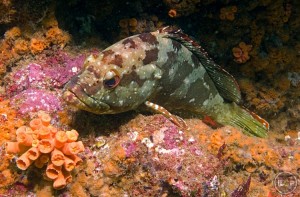June 2014 update: Mexico coupled systems research

Members of our team continue to share our findings with fishermen, resource managers, conservation practitioners, and other experts in the communities in the vicinity of Loreto, Espiritu Santo, and Cabo Pulmo National Parks, where we have conducted extensive ecological and social science research. In January 2014, for example, as part of an effort to report preliminary results from previous data-gathering efforts and obtain feedback from stakeholders, Mateja Nenadovic and Xavier Basurto (Duke) organized meetings with fishers, government officials, and NGO employees in four communities. Summaries from these meetings are available here.
Science translation and communication is a continuing element of this program; Heather Leslie (Brown), Kara Pellowe-Wagstaff (Brown), Mateja Nenadovic (Duke), and Xavier Basurto (Duke) engaged in similar activities in August 2013 and May 2014. Gustavo Hinojosa (CBMC) and Octavio Aburto (Scripps) regularly interact with stakeholders throughout the region, as well, through the ecological research program (see below).
DataMares is growing
If you haven’t looked at DataMares recently, now is a great time! The goal is for this data portal to serve as a hub for researchers, practitioners, and policymakers interested in the Gulf region to manage, visualize, and share data. There are ?100 users registered and we observed an increase in the number of non-government and academic institutions utilizing information from the DataMares platform in the last six months. Register to gain full access to the metadata and datasets available to our team or contact Marcia Moreno-Baez with questions.
Mazatlan fisheries symposium draws a crowd
Octavio Aburto (Scripps) organized a symposium for the Southwestern Regional meeting of the American Fisheries Society in Mazatlan, Mexico in April 2014. Octavio, along with Marcia Moreno-Baez (Scripps), Brad Erisman (Scripps), Alexandra Sanchez (CBMC) and Mateja Nenadovic (Duke) presented papers related to our collaborative project. The session drew researchers from government, the non-profit sector, and academic institutions throughout the region.
Ecological research
The subtidal monitoring team is gearing up for the training course and monitoring later in Summer 2014. In Summer 2013, a total of 119 reef sites and coastal environments were surveyed around the islands, islets and mainland in the southern part of the Gulf of California. Of those, 14 were located at Loreto (85 transects), 33 at the Corredor San Cosme-Punta Mechudo (192 transects), 40 at La Paz (193 transects), 17 at Cabo Pulmo (76 transects), 8 at Cabo San Lucas (38 transects) and 7 at Marietas Islands (38 transects). These data are relevant to the effects of changes in the management of the National Parks at Cabo Pulmo, Espirtu Santo, and Loreto, as well as the fisheries refugia recently established in the Corredor.
And on the personal front…
Welcome to new graduate students Kara Pellowe-Wagstaff (Brown, as of 9.13) and Alfredo Girón (Scripps, as of 9.14).
Best wishes to Sri Nagavarapu (Brown) and Sheila Walsh Reddy (TNC), who ended their formal engagement with the project in March 2014.
Congratulations to Octavio Aburto (Scripps) who began his faculty position at UC San Diego’s Scripps Institution of Oceanography in July 2013.
Congratulations to Brad Erisman (Scripps) who starts a faculty position at University of Texas at Austin’s Marine Science Institute in Port Aransas in Summer 2014.
Congratulations to Shumin Zheng (Duke), who successfully defended his Masters thesis, which was co advised by Sheila Reddy and Marty Smith, in May 2014.
Good luck to Marcia Moreno-Baez (Scripps) and Katherine Siegel (Brown), who will present related research at the International Marine Conservation Congress in Scotland in August 2014. Ditto to Heather Leslie (Brown), who will present at the Ecological Society of America meeting in Sacramento in August 2014.
Have a great summer!
